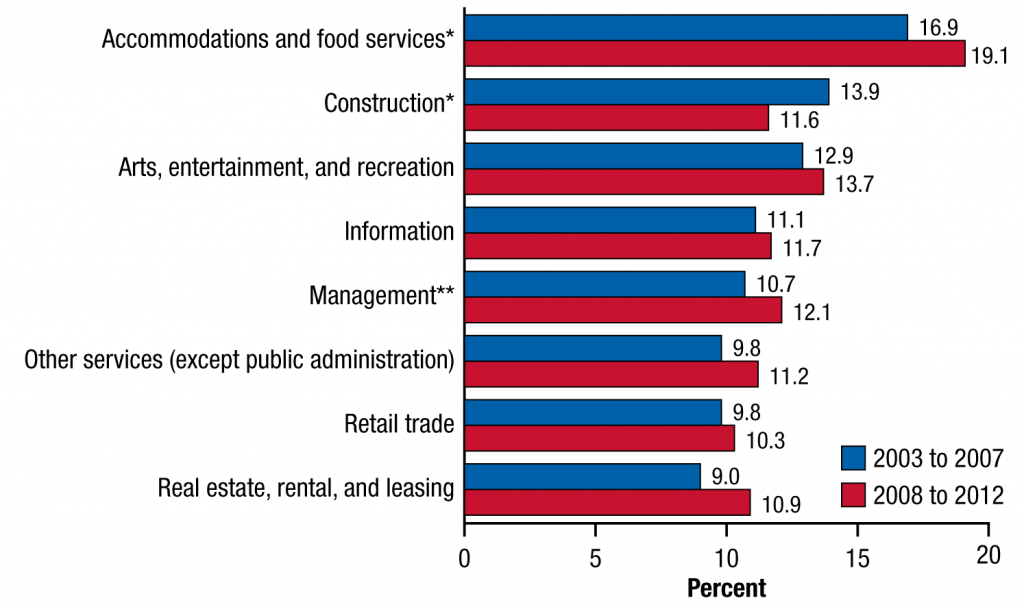Professionals
According to SAMHSA, 9.5% of full-time workers age 18-64 are dependent on drugs or alcohol. The most commonly used drug is marijuana. There are many successful business professionals who have struggled with addictions, but the good news is that recovery is possible.
In this article
Substance Abuse Among Professionals
Drug and alcohol addiction in the business world is more common than one might think. Business management, in particular, is one of the industries with a higher-than-average rate of drug and alcohol abuse. For example, one study done by SAMHSA found that from 2008 to 2012, over 12% of the business professionals interviewed admitted to using an illegal drug within the past month.
Furthermore, this trend has been steadily increasing since 2003. This could have to do with many factors, including the high-stress environment of the business world, the intense expectations of the industry, and even the personality profile of people who tend to do well in the business world.

How Common Is Mental Illness Among Professionals?
There is a documented tendency for successful entrepreneurs to experience higher rates of mental health issues than the general population. One study found that between entrepreneurs and the general population, the rates of these particular conditions are as follows:
- Depression: 2x higher among entrepreneurs
- ADHD: Over 5x higher among entrepreneurs
- Addiction: 3x higher among entrepreneurs
- Bipolar Disorder: Over 10x higher among entrepreneurs
It has been clear for some time now that if someone is struggling with co-occurring mental health and substance use disorders, one condition can worsen the other. Finding comprehensive programs for both conditions simultaneously can improve someone’s chances of achieving long-term sobriety.
Treatment For Professionals
At The Summit Wellness Group, we know that substance use disorders can often co-occur alongside other mental health issues. This can complicate the recovery process if someone does not receive treatment for both conditions. We use a multi-faceted approach in our drug and alcohol programs. We combine the most effective medications, clinical therapies, and holistic recovery practices to give someone the highest level of care.
We also understand that juggling work, recovery, and family responsibilities can be a very tall order. Our customizable and personally tailored plans are flexible enough to accommodate any schedule while also giving our clients the most comprehensive and compassionate care available. Recovery may not always be easy, but with help, it is possible.
Will I Lose My Job?
Thanks to some provisions in the Family and Medical Leave Act (FMLA) and the Americans with Disabilities Act (ADA), employees may not be fired from their job for entering a substance abuse program. This would apply to people who are physically or psychologically addicted to a substance, as this is considered a “substantially limiting impairment” by the ADA. This would not apply to casual drug users.
That being said, there are some circumstances that could result in a legitimate termination. These could include active use of drugs or alcohol while on the job or secondary behaviors that interfere with someone’s ability to perform their job. If someone is seeking treatment and is concerned about losing their job, oftentimes the most successful strategy is to get out in front of the issue and have a proactive conversation with their employer’s HR department.
The state of Georgia has a comprehensive directory of state and federal employment laws available so that someone may find out more about the protections and limitations of these laws.
Will Anyone Know That I’m in Treatment?
There are some very comprehensive legal protections that ensure privacy and confidentiality for people who enter substance abuse programs. The enactment of the Code of Federal Regulations, Title 42, Section 2 in 1975 ensures that very strict privacy guidelines must be managed by substance abuse programs. Under the final ruling, which took place in 2017, it is unlawful for any healthcare provider to disclose substance abuse history to any organization or individual without the written consent of the individual who underwent treatment.
The Health Insurance Portability and Accountability Act (HIPAA) elaborated these confidentiality rules about someone’s medical and healthcare records. It increased the enforcement of patient confidentiality by increasing the fines and penalties of any organization or individual who is in violation of these privacy and confidentiality laws.
In short, someone will only know if you participated in a substance abuse program if you choose to let them know.
What if I Can’t Take Time Off Work?
There may be cases where someone is unable to afford time off of work to attend a program. We provide intensive outpatient programs in the evenings for this reason. Finding treatment shouldn’t mean choosing between getting help or meeting your responsibilities. Our Atlanta evening IOP is from 6:00 pm to 9:00 pm three days a week.
Getting Help
Recovery is a journey. If someone hopes to have a healthy journey, then professional help is often needed. Our two locations in Georgia are both accessible from anywhere in the state as they are both near major highways.
- Our Roswell center is just across the street from Wellstar North Fulton Hospital in between Roswell and Alpharetta.
- Our Atlanta treatment facility is just a few minutes west off of I-75/85 near downtown Atlanta.
Find out more by calling us 24/7 at 770-299-1677.
We’re Here To Help
Get help now
We’d love the opportunity to help you during this overwhelming and difficult process. The Summit Wellness Group is located in Georgia and all of your calls will be directed to one of our local staff members. Our sincere passion is helping people recover so that they can live full, meaningful and healthy lives.
Call us 24/7 at 770-299-1677. If we aren’t the right fit for you then we’ll utilize our expertise and connections within the treatment industry to assist you in finding the best provider for your specific needs. Alternatively you can fill out our contact form and a member of our staff will contact you shortly.
